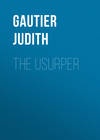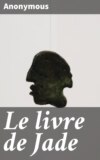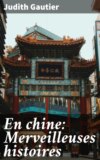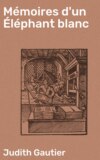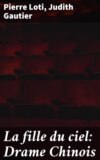Kitabı oku: «The Usurper», sayfa 8
"Now," said she, laughing, "Buddha himself has no more wisdom than I."
"You laugh," said Simabara; "for my part, I believe in the virtues of the water: that is why I do not taste it."
They took a very rough path. Its very look made the women utter cries of alarm. Some declared that they would never risk their lives on such a road; but the lords went first, and extended their shut fans to the most timid, and thus the top of the mountain was reached. But then the cries of distress were redoubled. Before them lay a tiny torrent, which ran babbling over the stones; it must be crossed by jumping from rock to rock, at the risk, if one were awkward, of wetting the feet.
The Kisaki asked Nagato to let her lean on his shoulder, and passed safely over. Some of the women followed her; then turned to laugh, quite at their ease, at those who dared not venture.
One young princess paused in mid-stream, standing on a rock; she held close about her the ample folds of her robe; and, half laughing, half dismayed, would neither go forward nor backward. She only resolved upon crossing the dangerous ford when her friends threatened to leave her alone in the middle of the torrent.
There were but a few steps more to be taken ore they reached the western orchard, which is surrounded by a hedge of tea-plants. The Queen pushed open a lattice-gate, and entered the enclosure.
It was the most enchanting spot imaginable. The spring, at this height, is somewhat tardy; and while in the valley the fruit-trees had already shed all their flowers, here they were in full bloom. Upon the undulating surface carpeted with thick turf, plum-trees covered with tiny white stars, apricots, apple-trees, peach-trees with their pink flowers, cherries decked with dark-red bloom, bent and twisted and stretched in every direction their dusky branches, whose roughness formed a marked contrast to the frailty of the petals.
In the middle of the orchard a large carpet was spread on the grass, and a red satin curtain, held up by gilded poles, flapped above it. A collation was served on this rug in costly china dishes.
The guests gladly squatted around the trays loaded with dainty provisions; the walk had given all an appetite. The women arranged themselves in two groups to the right and left of the Kisaki; the men took their seats opposite her at a respectful distance.
The most outspoken gayety soon reigned throughout the noble assembly; laughter bubbled from every lip. They chattered loudly, and no one heeded the melodies discoursed by an orchestra hidden behind a screen made from fibres of the reed.
Fatkoura alone wore a gloomy look and remained silent. The Princess Iza-Farou studied her by stealth with increasing surprise; she also looked from time to time at the Prince of Nagato, who seemed lost in a delightful dream, but never turned his eyes in the direction of Fatkoura.
"What has happened?" murmured the Princess. "He has certainly ceased to love her; and I thought the wedding was so near at hand!"
The feast ended, the Kisaki rose.
"Now," said she, "to work! Let each one of us draw inspiration from Nature to compose a quatrain in Chinese characters."
They scattered in various directions beneath the trees; each one went apart and reflected. Some paused before a blossoming branch; others walked slowly along, their gaze fixed on the ground, or with head uplifted towards what could be seen of the sky through the constellations of snowy or rose-tinted flowers. Some lazy spirits stretched themselves at full length on the turf and closed their eyes.
The bright and lively hues of their dresses shone forth gayly against the green, and added one more charm to the landscape.
Soon all the poets were recalled. The time fixed for the framing of the quatrain had elapsed. They assembled and sat down on the grass. Servants brought in a huge bronze bowl, upon the sides of which writhed sculptured dragons in the midst of imaginary shrubbery. This bowl was full of white fans, decorated only by a slight sketch in one corner. On one was a tuft of iris; on another a few slender reeds, a cottage by a lake, over which bent a willow, or a bird grasping a branch of almond-flowers in his claws.
Each competitor took one of these fans, upon which he was to write his verse. Brushes and India ink ready mixed were also brought. Soon the black characters stood in four perpendicular rows upon the white surface of the fans; the poems were finished. Each poet read his own quatrain aloud.
The Princess Iza-Farou began: —
"THE FIRST FLOWERS
"How fleeting, in life, is the time
When we have only joys, hopes, and no regrets?
Which is the most delicious moment of spring?
That when not a single flower has yet faded."
Lively approval hailed this poem.
When silence was restored, Simabara took up the word: —
"THE LOVE OF NATURE
"I lift my head, and I see a flock of wild geese.
Among those travellers one, who erst was in the van, now lags
behind her mates.
See how she flies behind the rest. Why does she linger thus?
Because from the heights of heaven she wonders at the beauty
of the scene."
"Good! good!" cried the listeners.
Some of the princes repeated the last line, shaking their heads with satisfaction.
Several other quatrains were read; then the Kisaki repeated hers: —
"THE SNOW
"The sky is clear; the bees hum o'er the garden beds;
A balmy breeze blows through the trees;
It makes the plum-blossoms fall in showers.
How delightful is the spring snow!"
"You are the master of us all!" was the enthusiastic shout. "What are our verses beside yours!"
"Our great poet, Tsourai-Iouki,10 never wrote a more perfect poem than that," said the Prince of Nagato.
"It was from that poet I drew my inspiration," said the Kisaki, smiling with pleasure. "But it is your turn to read, Iwakura," she continued, glancing at the Prince.
Nagato opened his fan and read: —
"THE WILLOW
"The thing which we love more than all else, we prefer that no one
else should love.
It belongs to another.
So the willow, which takes root in our garden,
Bends, blown by the wind, and adorns our neighbor's wall with
its branches."
"The illustrious Tikangue11 might be your brother," said the Kisaki; "there is no quatrain in his works superior to that. I wish to preserve the fan that your hand has illustrated; give it to me, I beg."
Nagato approached the Queen, and, kneeling, offered her the fan.
Fatkoura abruptly recited the following lines, which she improvised on the spur of the moment: —
"The pheasant runs through the fields; he attracts all eyes by his
gilded plumage;
He cries aloud as he seeks his food.
Then he turns towards his mate,
And through love for her he involuntarily betrays the place of
his retreat to men."
The Queen frowned, and paled slightly. A transport of rage made her heart palpitate; for she saw that Fatkoura, by this improvisation, hurled an outrageous insult at Nagato and herself. She slandered her sovereign with the daring of a soul which has lost all, and offers one buckler to revenge, – despair.
The Kisaki, feeling her inability to punish, was seized by a vague terror, and repressed her wrath. If she acknowledged that she understood the injurious intention of Fatkoura's words, must she not confess to a guilty prepossession, – an interest unworthy of her majesty, – in the love to which her beauty had given birth in the heart of one of her subjects?
She complimented Fatkoura in a very quiet voice upon the elegance of her poem; then she sent her by a page the prize offered for competition. It was a charming collection of poems, no longer than a man's finger; the fashion being for the smallest books possible.
Some hours later, while the Prince of Nagato, leaning over the edge of the terrace, was gazing down from the mountain top at the setting sun, which shed its purple glory across the sky, the Kisaki drew near him.
He lifted his eyes to her face, thinking that she wished to speak to him; but she was silent, her eyes fixed on the horizon, and full of sadness; she preserved a solemn attitude.
The reflection from the western sky disguised her pallor. She repressed some painful emotion, and strove to restrain a tear that trembled on her lashes and dimmed her sight.
Nagato felt a sort of terror; he was sure that she was going to say something dreadful to him. He would fain have prevented her from speaking.
"Queen," said he, softly, as if to dismiss the danger, "the sky looks like a great rose-leaf."
"It is the last falling leaf of day," said the Kisaki, – "of the day which is sinking into the past, but whose memory our spirits will preserve as a day of joy and peace, – perhaps the last."
She turned away to hide her tears, which, despite her efforts, flowed fast.
The Prince's heart was oppressed with inexpressible agony; he was like the victim who sees the knife at his throat. He dared not speak, lest he should hasten the sacrifice.
Suddenly the Kisaki turned to him.
"Prince," said she, "I have something to say to you: you must marry Fatkoura."
Nagato stared at the Queen in dismay; he saw her eyes were wet with tears, but full of a calm and irrevocable resolve.
He slowly bowed his head. "I will obey," he murmured.
And while she moved quickly away, he hid his face in his hands, and gave vent to the sobs which were stifling him.
CHAPTER XIII.
THE MIKADO'S THIRTY-THREE DINNERS
The sublime Son of the Gods was bored. He sat cross-legged on a raised dais covered with mats, between curtains of gold brocade which hung from the ceiling and were drawn back in heavy folds on either side. A succession of rooms opened, one from another, before the monarch's gaze.
He thought that he was very majestic; then he yawned.
The one hundred and ninth Mikado, Go-Mitzou-No, although young, was excessively fat, – made so, no doubt, by the almost constant inaction of his life. His face was pale, no ray of sun ever resting on it; several chins reposed upon his breast; his purple robes fell about him in ample folds; the lofty plate of gold adorned his brow. At his right were arranged all the insignia of his omnipotence, – the sword, the mirror, and the iron tablet.
The Mikado found his existence monotonous. Every action of his life was arranged in advance, and must be accomplished in accordance with the most minute etiquette. If he left the precincts of the palace, he was shut up in a superb vehicle drawn by buffaloes; but he felt suffocated in that close box, and preferred to remain on his throne. If he wished to admire the flowers in his garden beds, he must go out in company with a vast suite, and the annals of the kingdom made careful note of the event. The greater part of his time was supposed to be passed in meditation: but to tell the truth, he meditated very little; his intellect had become blunted. When he tried to think, the strangeness of the ideas that buzzed confusedly through his brain astonished him. Some of his fancies were criminal, some ludicrous. The latter amused him; but he dared not laugh, knowing that he was watched. He would then strive to bring his mind back to celestial things; but it wearied him, and he returned to his whimsical dreams. Sometimes he was seized by an irresistible desire to move about, to run and jump and leap; but that would ill comport with the silent immobility appropriate to the descendant of the Gods. One day, however, – or rather one night, the mysteriously achieved his desire. He slipped out of bed, and while all around him slept, he performed a wild dance; no one ever knew it, – at least so he thought. As he never saw anything but the bent back of his subjects, he may really have supposed that he belonged to a superior race, and that the common herd of men walked on all fours. And yet he thought that they sometimes treated him like a child. His bow and arrows were taken away, because on one occasion, while a body of delegates from the Shogun lay prostrate before his throne, he let fly an arrow at the highest dignitary among them. In spite of the rage which sometimes boiled within him, he dared not rebel; his inaction, the perpetual association with women, who alone could serve him, had weakened his courage. He felt that he was at the mercy of his ministers; he feared lest he should be assassinated.
And yet, at times, an immense pride took possession of him; he felt divine blood course through his veins; he knew that the earth was not worthy to be trodden beneath his feet, that the race of men had no right to behold his face; and he dreamed of making thicker still the veils which separated him from the world. Then, the very next moment, he would fancy that perfect happiness lay in solitary rambles over the mountains, in working in the open air, in being the lowliest of men; then he would be seized by a vague despair, he would groan and bewail his fate. But he was soon persuaded that his grief was nothing but a homesick longing for heaven, his native land.
Just now the Mikado was ready to receive the envoys from Fide-Yori. They had come to testify the latter's gratitude towards the supreme ruler, who had conferred the title of Shogun upon him.
The curtains were drawn before the throne; then the princes were ushered in, falling at once upon their faces, with arms extended in front of them. After a long delay the curtain was drawn aside.
Profound silence reigned: the princes remained with their faces on the floor, motionless.
The Mikado considered them from the height of his throne, and made silent reflections upon the arrangement of the folds of their garments, on a sash end which had turned over and showed him the wrong side. He thought that the crest of Satsuma, a cross within a circle, looked like a dormer window barred by two bamboo slats.
Then he wondered what they would all think if he were suddenly to utter frantic yells! How he would like to see them jump up, with stupefied faces!
In a few moments the curtain was again let down; the princes withdrew backwards. Not one word had been uttered.
After the audience the Mikado left the platform and was stripped of his very burdensome state dress. Robed once more in simpler garments, he bent his steps towards the apartments in which he took his meals.
Go-Mitzou-No regarded the dinner-hour as the most agreeable moment in the day; he prolonged it as much as he possibly could. The Mikado liked good living; he had a decided preference for certain dishes. On account of these preferences a terrible difficulty had formerly arisen. The Son of the Gods could not reasonably be expected to bend his lofty mind to the details of the kitchen and decide upon the dishes he would eat; and yet no more could he submit to the caprices of his cooks or his ministers. After prolonged reflection the Mikado found a way to reconcile all parties. He ordered that thirty-three entirely different dinners should be prepared for him every day, to be served in thirty-three saloons. It then only remained for him to walk through those rooms, and choose the meal that pleased him best.
Sometimes it happened that after eating one dinner he would go into another hall and eat a second.
When he crossed the threshold of the first of the thirty-three rooms, twelve very noble and most beautiful damsels received him. They alone were entitled to wait upon him. Their hair, in the presence of their lord, must be undone, and hang dishevelled in the folds of their trailing garments.
The Mikado had seated himself on a mat before the dinner of his choice, and had begun to eat, when the Kisaki entered, unannounced. She, too, when appearing before the supreme master, was obliged to wear her hair flowing loosely. Her superb black tresses were therefore unconfined, and fell in waves to the very ground.
The Mikado raised his eyes to her in amazement, and hurriedly swallowed the morsel that he had in his mouth.
"My beloved companion," said he, "I did not expect to see you!"
"My divine lord," she replied, "I have come to inform you that I shall very soon lose one of my women; the fair Fatkoura is about to marry."
"Very good! very good!" said the Mikado; "and whom?"
"The Prince of Nagato."
"Ah-ha! I consent to the marriage."
"And what princess do you name to take the place of the one who is to leave me?"
"I will name any one whom you may select."
"I thank you, master," said the Kisaki; "and I depart from your divine presence, imploring your pardon for having dared to interrupt your repast."
"Oh, it's no matter!" said Go-Mitzou-No, who hastened, as soon as his wife had gone, to make up for lost time.
CHAPTER XIV.
THE HAWKING-PARTY
Some days after the reception of the embassy, towards the tenth hour of the morning, the hour of the serpent, a young cavalier rode at full speed along the road which leads from Osaka to Kioto.
At that hour the road is very crowded; beasts of burden, pedlers, men and women of the people pass and repass along its entire length. Peasants carry the produce of their fields to the suburban towns; they are on their way to Fusimi, Yodo, and Firacca. Merchandise of every kind is taken from Osaka to Kioto, – rice, salt-fish, metals, and precious woods; while Kioto sends to the city of the Shogun tea, silk, bronze vases, and various sorts of lacquered ware.
The young horseman paid not the faintest heed to the crowd; he gave his steed the reins, and urged him on with his voice. Moreover, the road was always free before him; people sprang quickly aside at the sound of the furious galloping feet, and the passers-by retreated to the roadside, which was bordered here and there with houses made of beech-wood.
The rider moved so rapidly that, in spite of all their efforts, the curious could not distinguish his features.
"It's a warrior," said one; "I saw the gleam of his weapons."
"That was no great thing to see," said another; "every time he moved he glittered like lightning."
"It's a warrior of high rank; I saw the gold thongs of his whip of office."
"Is he a general?"
"Ask the swallow, as she flies, to see whether the copper horns shine upon his helmet; she alone is capable of overtaking that knight."
When he reached Kioto, the young soldier did not slacken his pace; he rode through the city at a gallop, and entering the palace, inquired for the envoys of the Shogun.
"They are at the summer-palace," was the answer; "or rather they are not there. They have joined our divine Kisaki in the chase; they started at sunrise."
"In which direction did they go?"
"Towards the shores of Lake Biva, at the foot of the mountains," replied the lackey; "but, my lord, do you wish to join the illustrious hunters?"
"Bring me a horse," said the young man coldly, without answering the question.
At the same time he alighted, and the servant led away his weary steed; soon two grooms brought forward another, equipped, and full of spirit.
The soldier again mounted, and rode away.
Lake Biva lies behind the chain of hills that surrounds Kioto. To reach it, several valleys must be traversed, and many roundabout paths pursued. The young man could not keep his horse at a steady gallop, on account of the many hills up and down which lay his course. Sometimes, instead of following the windings of the road, he galloped over the thick grass in the valleys, to cut short his journey. At the end of an hour he came out upon the lake-shore; but then he did not know which way to turn.
The lake, blue as a sapphire, stretched before him far as the eye could roach. To right and left rose small copses and thickets and brown rocks; whilst beyond them lay broad pastures covered with moss and heath. Of the hunt, no trace, no sign by which he might guess in which direction he was to follow.
The young soldier seemed in no wise disconcerted by this circumstance; he spurred his horse up a slight eminence and gazed around him. He then perceived, in the midst of a bamboo grove, the roof of a tiny temple half buried in the trees. Thither he hurried, and, without dismounting, rudely struck the alarm-bell.
The noise waked the keeper of the temple, a bald-headed old bonze, with long, thin face.
He ran out, rubbing his eyes.
"Do you know which way the royal hunt went?" said the young man.
"This morning I heard the barking of dogs, the neighing of horses, and loud laughter," said the bonze; "but I saw nothing. The hunters did not pass this way."
"Then they must have gone to the right," said the warrior, dropping a piece of silver into the alms-chest covered with a lattice work of bamboo.
He started off at a gallop. He rode for a long time, pausing occasionally to listen. At last he heard a distant barking, although the shore lay desolate before him. He stopped, and looked in all directions.
The barking came from the mountains; the sound of horses' hoofs was also indistinctly heard.
Suddenly, without a break, the sounds became loud and clear. Black dogs sprang from a narrow gorge between the hills, speedily followed by men on horseback.
The entire hunt passed before the young man. He recognized the Kisaki by the red gauze veil which floated around her. Some of the princesses held a hooded falcon upon their left fist. The lords bent forward, ready to let fly their arrows; each grasped a huge black lacquer bow.
As all the hunters had their heads thrown back, and were watching a falcon chasing a buzzard, high in the heavens, they passed without observing the young warrior. The latter at once rode alongside of them.
The dogs started a pheasant, which rose screaming from a bush. A fresh falcon was unleashed.
As he rode, the soldier sought out, among the nobles, the Prince of Nagato, and approached him.
"Stay, Iwakura!" he cried; "Fide-Yori sends me to you."
The Prince turned his head with a start; he drew in his horse. They lingered behind.
"Signenari!" exclaimed Nagato, as he recognized the young leader. "What has happened?"
"I bring important news," said Signenari. "Civil war threatens us. Hieyas has levied armies; he holds half Japan. With an amazing promptitude, he has collected large forces, – far superior to ours. The danger is imminent; therefore the master desires to rally all his followers around him."
"Alas! alas!" cried Nagato, "the future alarms me! must the land, then, be bathed in the blood of its own children? What does General Yoke-Moura say?"
"Yoke-Moura is full of energy and confidence; he has assembled a council of war. But still another misfortune has befallen us: we have lost the Prince of Mayada."
"Is he dead, that dear old man?" said Nagato, bowing his head, – "the only one who never yielded to the invading power of Hieyas! He could not have loved Fide-Yori more dearly, had he been his father. It was he who, on the death of the Tycoon, brought the little boy into the Hall of a Thousand Mats and presented him to the princes, who swore allegiance to him. How many have betrayed him since that day. How many more will yet betray him! Poor Mayada, you alone could win some semblance of respect from Hieyas; now he fears nothing mortal."
"He shall fear us, I swear it to you!" cried Signenari, with an heroic flash in his eye.
"You are right! Forgive me for this temporary weakness," said the Prince, lifting his head. "I am so crushed with grief that this sad news overwhelmed me for an instant."
The hunters had noticed the Prince of Nagato's absence. Supposing some accident had occurred, an alarm was raised, and the whole Court came flying back.
They soon perceived the Prince, talking with Signenari. They joined and surrounded them, asking a thousand questions. The dogs barked, some of the horses reared and plunged; the falconers recalled their birds, who refused to obey, and continued to pursue their prey.
"What has happened?" said one.
"It's a messenger."
"Does he bring tidings from Osaka?"
"Bad news!"
Nagato led Signenari to the Kisaki's side.
The Queen was mounted on a white horse covered with a network of pearls, and decked with silken head-tassels.
"Here is the bravest of your soldiers," said Nagato, turning to Signenari. "He comes from Osaka."
Signenari bowed low; then resumed his grave and reserved attitude.
"Speak!" said the Kisaki.
"Divine Sovereign, it is with pain that I disturb your pleasures," said Signenari; "but I must inform you that the peace of your kingdom is threatened. Hieyas has raised a part of Japan in revolt; he is preparing to attack Osaka, that he may usurp the power intrusted to your servant Fide-Yori by the celestial Mikado."
"Is it possible!" exclaimed the Kisaki. "Would Hieyas dare commit such a crime? Has the man no soul, that, to satisfy his insatiate ambition, he does not hesitate to arm brothers against brothers, and to shed on Japanese soil the blood of Japan's sons? Are you sure of what you state?"
"The news was brought to Osaka last night by messengers sent in hot haste by the princes; the latter were hurriedly striving to fortify their provinces. The Daimio of Arima arrived this morning at dawn and confirmed the news of the messengers. Scouts were instantly sent to various points, and the Shogun ordered me to recall his ambassadors as swiftly as possible, to hold a council."
"Let us return to the palace," said the Kisaki.
The party set out silently; only the princesses whispered together as they stared at the young warrior.
"What a beauty he is?"
"You might take him for a woman!"
"Yes; but what daring in his eye!"
"What coldness too! His tranquil gravity disquiets and alarms."
"He must be terrible in battle."
"Terrible, too, to her who loves him; his heart seems to be of steel, like his sword. Do not look at him so steadily."
Nagato rode up to the Queen.
"These events will delay your marriage, Iwakura!" said she, with a strange feeling of delight.
"Yes, Queen," said the Prince; "and the chances of war are many: perhaps it may never take place. However, as Fatkoura is publicly known as my betrothed, I wish her to go, until the wedding, to my castle of Hagui, where she will live with my father. If I die, she will bear my name, and be ruler over the province of Nagato."
"You are right," said the Kisaki; "but death will spare you. I will make vows for your preservation."
Nagato looked at her reproachfully. He dared not speak, but his eyes expressed his thought; they said plainly: "You know that death would be sweeter to me than the union which you force me to make."
The Kisaki, deeply moved, turned away her head and spurred on her horse. They returned to the Dairi.
When the Mikado learned the tidings of probable war, he seemed afflicted; but in secret he rejoiced. He did not love the Regent, nor did he care much more for the Shogun. Although he was their sovereign lord, he had a confused feeling that they ruled him. He knew that they both kept a watchful eye on him, and he feared them. He was therefore delighted to think that they would mutually inflict on each other all the evil that he wished them both.
That same day the envoys of Fide-Yori left Kioto and returned to Osaka.
